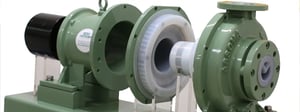
Factors affecting pump efficiency
The overall efficiency of a centrifugal pump is the product of three individual efficiencies: mechanical, volumetric, and hydraulic:
Mechanical efficiency
Mechanical efficiency includes losses in the bearings (long couples pumps), mechanical seals and stuffing box (in the case of packed gland pumps).
Volumetric efficiency
Volumetric efficiency will include internal losses due to leakage through the wear rings and balancing holes. Also, in the case of open or semi-open impellers, clearance between the impeller vane and the pump casing.
Hydraulic efficiency
Hydraulic efficiency includes liquid friction and other losses in the volute and impeller.
Although mechanical and volumetric losses are important components, hydraulic efficiency is the largest factor. There are basically two components that can affect the hydraulic efficiency of the centrifugal pump. The impeller, and the volute casing.
The affinity laws tell us quite a bit about the inner workings of an impeller. We know that, for any given impeller, the head it produces varies as the square of a change in speed. Double the speed and the head increases by a factor of four. If you keep speed constant, the same rules hold true for small changes in its diameter.
The flow through an impeller follows a similar rule. However, in this case its change is directly proportional to the speed or diameter change. i.e., if you double the speed or diameter, then the flow doubles. A change in rotational speed or impeller diameter refers to its peripheral speed or the speed (in meters per second) of a point at its periphery.
The head produced by an impeller is almost entirely dependent upon its peripheral velocity. The potential flow is influenced by several other factors such as the depth (cross sectional area) of the impeller vanes as well as the shape of the vanes themselves. The diameter of the impeller eye is also an important factor. This determines how easily the liquid enters the impeller and the ease with which liquid can pass through the impeller.






